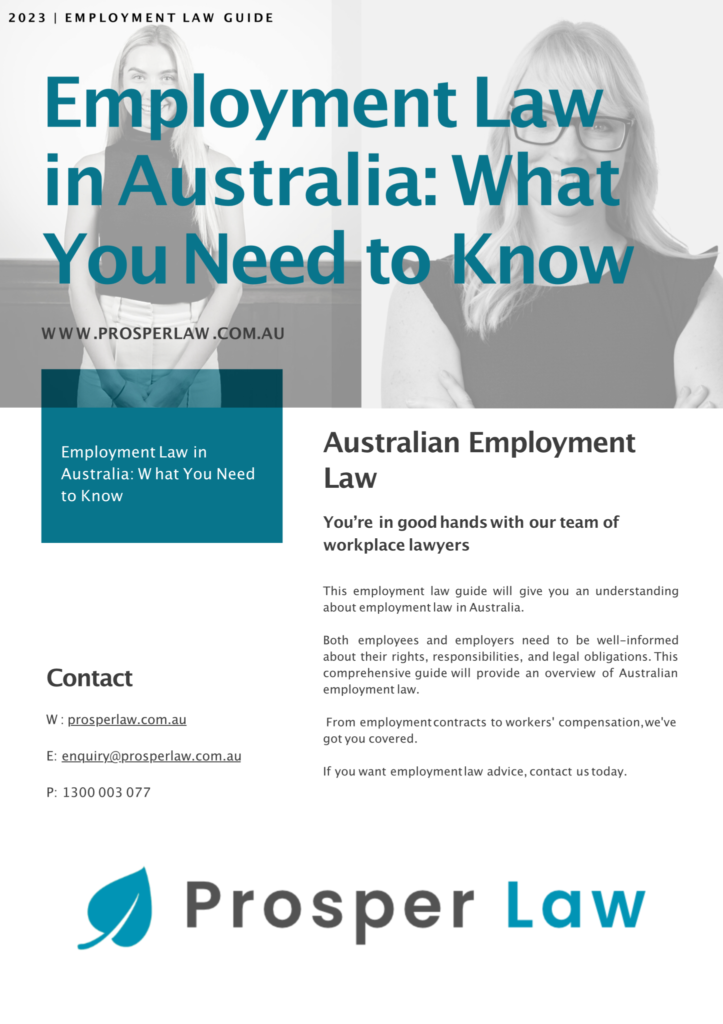Restraint of trade clauses in an employment contract often includes non solicitation provisions. The restriction on solicitation usually includes poaching clients from the employer and enticing current employees to leave the employer.
There is uncertainty about what constitutes solicitation and what doesn’t. Non solicitations clauses are sometimes found within a non compete clause Australia.
Farrah Motley is an experienced employment lawyer and the Director of Prosper Law. She discusses what the law says regarding ‘solicitation’ and provides examples.
Interpreting solicitation
There are two contrasting views on the interpretation of ‘solicitation.’
Narrow view of solicitation
The narrow view of solicitation is limited to active encouragement or incitement by the former employee.
This occurs when the former employee takes steps to persuade or induce clients of the former employer to switch to a competing business.
Additionally, this requires a high level of personal involvement and initiative by the former employee.
Broad view of solicitation

On the other hand, the broad view includes any behaviour that results in a former employee taking business away from their former employer. This includes circumstances where the client initiates the communication or even without active solicitation. Passive behaviour or preparation may be enough to constitute solicitation under this view.
Importance of distinction
The narrow versus broad views of solicitation affect the enforceability of restraint of trade clauses. If a court takes a narrow view, it may be harder for employers to enforce the clause.
Conversely, a broad view may make it easier to enforce. It requires only proof that the former employee’s behaviour resulted in the loss of business. Concurrently, the court’s approach depends on the case and the language in the clause.
The court considers various factors in deciding the enforceability of a non compete clause. These include the employer’s business, the employee’s length of stay, and the reasonableness of the restraint of trade clause.
Examples of acts of soliciting
Directly contacting clients of a former employer
When former employees contact their previous employer’s clients and encourage them to switch to their own business, this is referred to as poaching or solicitation. This could include reaching out to clients via phone, email, or social media. And this might breach the non solicitation clause.
Using confidential information to solicit clients
Former employees using confidential information, such as client lists or contact details, to solicit or entice clients away from their former employer may breach the non solicitation clause.

Offering incentives to switch
Former employees solicit clients if they offer incentives to former employers’ clients to switch to their businesses. A former employee offering a discount or free service to customers who switch to their company could be interpreted as an attempt to entice them away from their previous employer.
Conducting a campaign

A solicitation may be a direct attempt to persuade employees to leave their current employer for the new organisation of a former employee. Also, this can be accomplished through advertising, interviews, and other means.
Further, a campaign is a series of actions that give the impression that former employees attempt to persuade workers to switch to their company.
Case laws
Australian Clinical Labs Pty Ltd v Glew [2019] FCAFC 124
The court determined whether a former employee had violated a non-solicitation clause by taking work from former clients. It concluded that the former employee engaged in the solicitation by actively urging the former clients to end their contracts with the previous employer and sign up with the former employee’s new business.
Rushleigh Services Pty Ltd v Quarry Mining & Construction Equipment Pty Ltd [2011] NSWSC 382
It was held that an employee who merely handed over a business card to a former client did not breach a non-solicitation clause, because there was no active encouragement or incitement to move the business relationship to a new employer.
Harrison v Schipp [1975] 2 NSWLR 406
The court held that a former employee who merely informed a former client that he had started a new business did not breach a non-solicitation clause, since there was no active encouragement or incitement to move the business relationship to the new business.
Barrett & Ors v Ecco Personnel Pty Ltd [1998] NSWSC 545
The court held that the former employees had breached the restraint of trade clause by soliciting clients from their former employer, even though the clients had initiated contact with the employees.
Further, the court took a broad view of solicitation and found that the employees had taken actions to persuade the clients to follow them to a new business, which included discussing job opportunities and providing contact information.
Koops Martin v Dean Reeves [2006] NSWSC 449
Comparatively, in this case, the court found that the former employee had not breached the restraint of trade clause as there was no evidence of active solicitation.
The court took a narrow view of solicitation and found that the employee had not taken any affirmative steps to persuade clients to follow him to a new business.
The court also considered the reasonableness of the restraint of trade clause and found that it was too broad and restrictive, which limited the employee’s ability to carry out his trade.
How can Prosper Law help?
Prosper Law is a fixed-fee law firm. We provide restraint of trade legal advice for an upfront, fixed price.
If you need an employment lawyer who will work with you, contact us today for a no-obligation quote.




